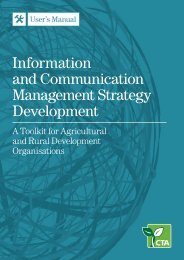Policy framework for Pastoralism in Africa
Policy framework for Pastoralism in Africa
Policy framework for Pastoralism in Africa
- No tags were found...
You also want an ePaper? Increase the reach of your titles
YUMPU automatically turns print PDFs into web optimized ePapers that Google loves.
emphasis on <strong>in</strong>dustrial and socio-economic progress and sophistication, which came to be popularlyknown as modernization. A major part of the move towards modernization was the commercializationof agriculture, characterized by the shift from subsistence to commercial farm<strong>in</strong>g, frompastoral communal ownership to privatization of pastoral land, and from pastoral traditional<strong>in</strong>stitutions of land management to seem<strong>in</strong>gly modern ones. With<strong>in</strong> these <strong>framework</strong>s pastoralistmobility cont<strong>in</strong>ued to be viewed as irrational and economically <strong>in</strong>efficient, despite an emerg<strong>in</strong>gbody of research which demonstrated that pastoralist production was at least as efficient as modernranch<strong>in</strong>g. One outcome of the misunderstand<strong>in</strong>gs about pastoralism was widespread appropriationof pastoral rangelands, especially <strong>in</strong> eastern and southern <strong>Africa</strong>.3.2.1 Negative trends: the myth of the ‘tragedy of the commons’Two <strong>in</strong>ter-related and powerful environmental narratives of land degradation and the tragedy ofthe commons were often applied to the modernization model of development, and were used tojustify ranch<strong>in</strong>g and other <strong>in</strong>terventions. The tragedy of the commons argument was based on thenotion that when a resource is held <strong>in</strong> common, a self-<strong>in</strong>terested actor will maximize their exploitationof the resource because they receives the full benefit of the changes, but the costs are spreadamong all users. Accord<strong>in</strong>g to the narrative, the result of everyone behav<strong>in</strong>g <strong>in</strong> this way was theru<strong>in</strong> of the commons. When applied to traditional <strong>Africa</strong>n pastoralism, the result (accord<strong>in</strong>g to thenarrative) was overgraz<strong>in</strong>g, soil erosion and bush encroachment.The logic of the tragedy of the commons argument as applied to <strong>Africa</strong>n pastoralism was laterwidely criticized, and from a technical perspective, marg<strong>in</strong>alized by rangeland scientists and ecologists.This was because the argument failed to take account of at least five important features ofpastoralism <strong>in</strong> <strong>Africa</strong> viz., pastoral herd dynamics and off-take; pastoralist mobility over wide andchang<strong>in</strong>g system boundaries; the dynamics of natural pastures, and annual or seasonal growthcycles; the traditional and sophisticated rules of rangeland access and management, and, the widercomplex social, cultural, political and economic rules regulat<strong>in</strong>g pastoralist communities.Although the tragedy of the commons arguments are now widely disregarded by scientists andprofessionals, modern-day policies cont<strong>in</strong>ue to allow appropriation of pastoral rangelands, withassociated displacement and impoverishment of pastoralists. Rangeland is taken over by farmers<strong>in</strong> countries where sedentary crop production is seen as preferable to livestock production; pastoralland is allocated to private companies <strong>for</strong> commercial agriculture, especially <strong>in</strong> river<strong>in</strong>e areas whichare often critical dry season resources <strong>for</strong> pastoralists; pastoralists are excluded from wildlife conservationareas which were <strong>for</strong>merly traditional rangelands; and pastoralists are displaced due tolarge scale irrigation schemes.In eastern and southern <strong>Africa</strong> there are no specific pastoral policies or laws that explicitly addresspastoral land tenure issues. Instead pastoral land tenure, when addressed, falls under other policy<strong>in</strong>struments and laws such as a national constitution or poverty reduction strategies, or as asub-component of national sector-based laws on land, <strong>for</strong>ests or the environment.3.2.2 Positive trends: pro-pastoral policies and legislation <strong>in</strong> <strong>Africa</strong>In West <strong>Africa</strong>, governments have passed a series of pastoral laws to protect pastoral land andenhance livestock mobility. For example, Gu<strong>in</strong>ea, Mauritania, Mali, Burk<strong>in</strong>a Faso and Niger have22 <strong>Policy</strong> <strong>framework</strong> <strong>for</strong> <strong>Pastoralism</strong> <strong>in</strong> <strong>Africa</strong>
















